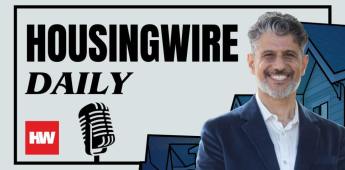Realtor.com’s George Ratiu on the student debt crisis
In this interview, Realtor.com’s Senior Economist George Ratiu discusses how the student debt crisis is impacting the nation’s financially strained borrowers.
Here is a small preview of the student debt crisis interview with Ratiu — be sure to watch the full interview above. The transcript below has been lightly edited for length and clarity.
Q: In 2000, the average student owed less than $20,000 in loans. However, by 2019, the nation’s total amount of student loan debt surpassed $1.6 trillion, averaging around $40,000 for the typical borrower. What’s to explain this climb in debt?
George Ratiu: It’s really a combination of factors that go all the way back to the 1940s, especially after World War II when the government took an active interest in encouraging young Americans, particularly veterans, to attend university. From those years, the federal government became ever more encouraging of students attending institutions of higher education, particularly during the Cold War.
However, in the 80s during the Reagan administration, a lot of states were squeezed due to higher taxes, resulting in the federal government taking the less-involved approach. This resulted in states’ budgets being crunched, which transferred costs of higher education from the government to students and their families.
Now you combine that with demographics, and add the wrinkle of the last recession, which is when a lot of Millennials came out of college and were facing really bleak prospects. This led many young Americans to continue pursuing higher education, which is why this cohort is the most educated in American history.
That being said, this obviously came at a cost. And so that’s why particularly for public schools, less involvement from the state level means that students have depended a lot more on borrowing to finance their educations.
Q: According to several reports, President-elect Joe Biden may enact some form of student loan forgiveness. In fact, during his presidential campaign, Biden supported a plan to void up to $10,000 in student loan debt for each borrower due to the COVID-19 pandemic. How would a cancelation of $10K impact American households?
George Ratiu: So, depending obviously on your philosophical approach, canceling student debt is a really great thing. And I would say on balance, it sounds like a great idea. Conversely, you might say, well, it’s a bad thing, because those who have already paid off their loans are not getting rewarded.
It’s important to note that any debt forgiveness will impact taxes, because under the current legislation, any student that has a loan forgiven, gets taxed as income received in that year. So, for a lot of borrowers simply having their debt forgiven, let’s say $10,000, that forgiven simply means they will owe the IRS some money as a result.
If Biden does enact some form of student debt forgiveness, the impact on American households will depend on how the regulation is written, because without changing the law to address the impact from taxation, the overall economic impact may not be as big as we would hope.
Now, having said that, I think that on balance, making some sort of solution to this issue is absolutely necessary. Because when we look at what’s happening in the educational landscape, we see costs keep rising. But at the same time for many graduates, sometimes even with master’s degrees, the employment landscape doesn’t provide the rewards they would expect given the expense.
So, I think it’s absolutely an issue that the Biden administration and the new Congress should absolutely tackle and look at, but simply writing off some student debt and calling it a day, obviously, I don’t think will be enough to jumpstart the economy.
Latest Videos
Sponsored Videos











